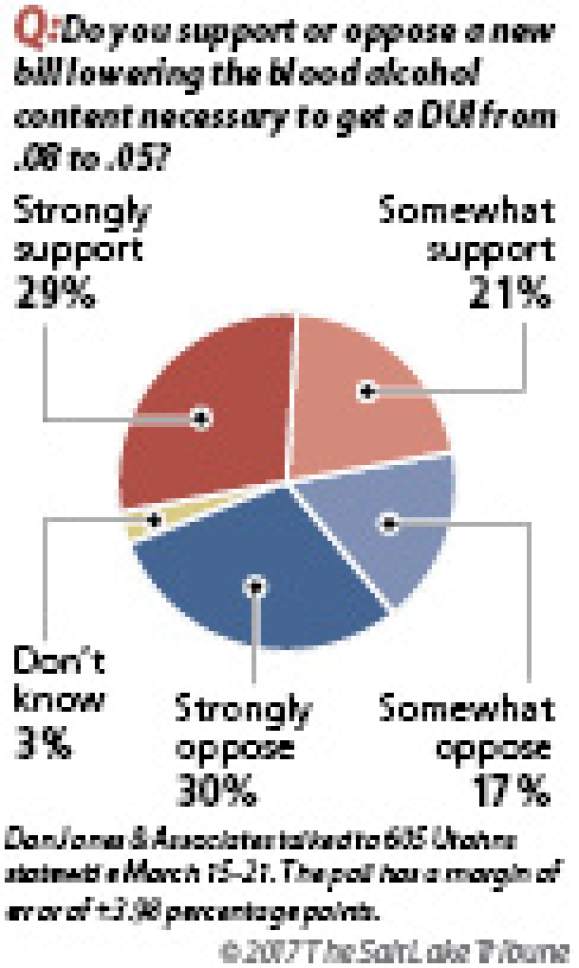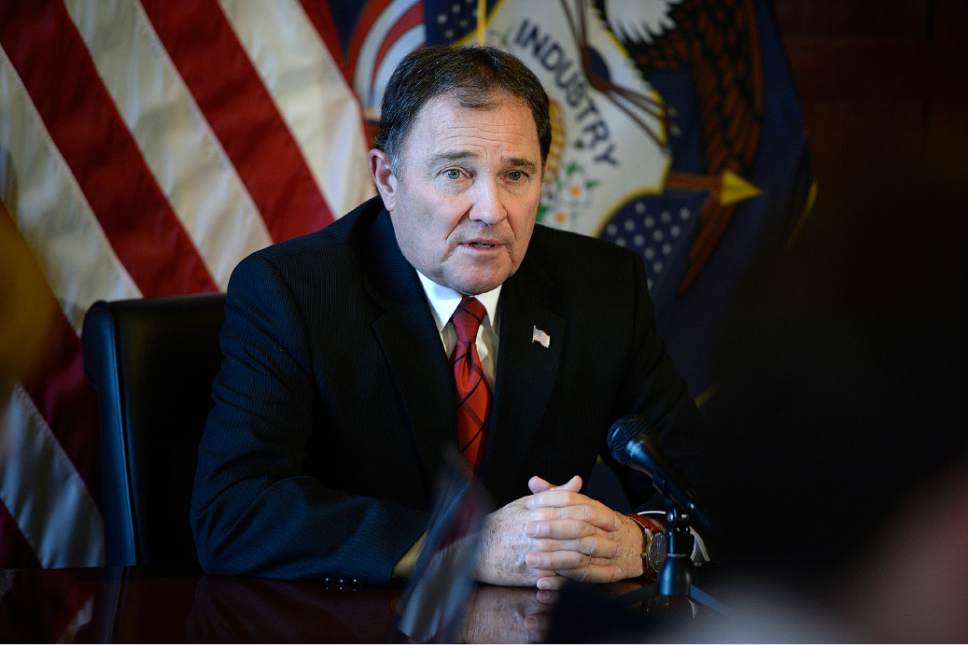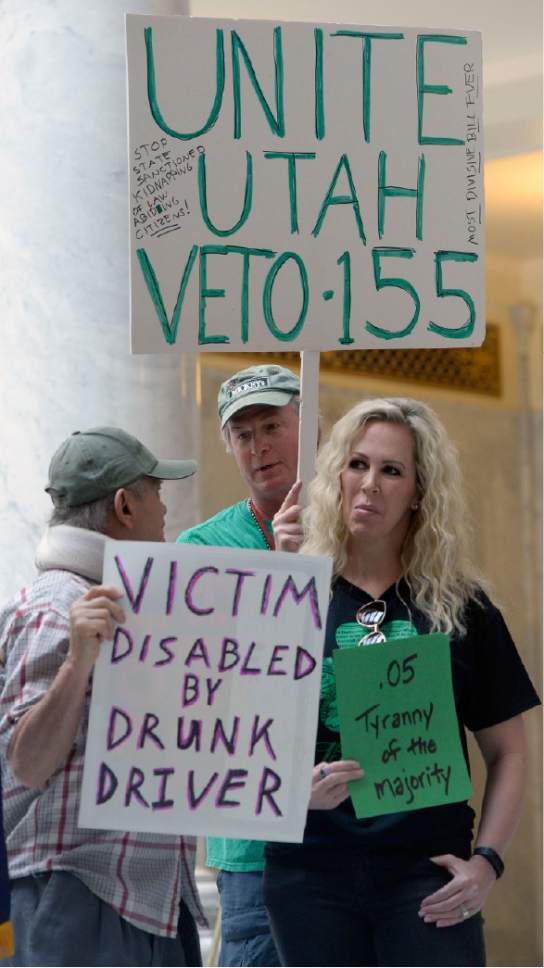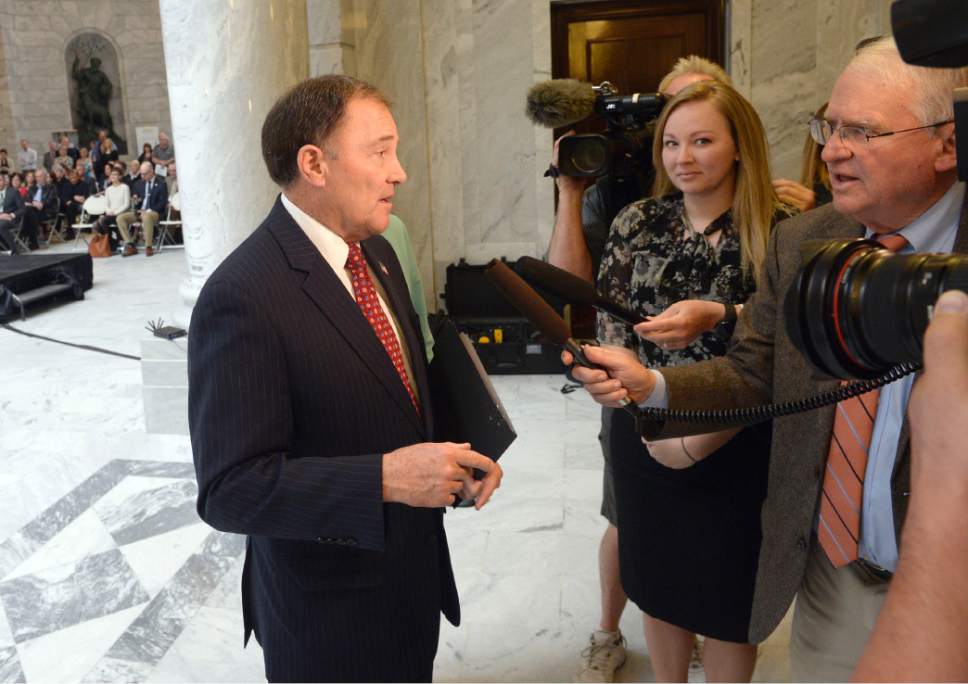This is an archived article that was published on sltrib.com in 2017, and information in the article may be outdated. It is provided only for personal research purposes and may not be reprinted.
After heavy lobbying by all sides, Gov. Gary Herbert on Thursday signed a controversial bill to make Utah's laws on drunken driving the toughest in the nation — but anticipates tweaks before it takes effect late next year.
That happened as a new poll by The Salt Lake Tribune and the Hinckley Institute of Politics shows that Utahns are evenly split on that bill. But the bulk of support comes from non-drinking "very active" Mormons, while all other religious categories overwhelmingly oppose it — even "somewhat active" Mormons.
At his monthly KUED news conference, Herbert said he was signing HB155 "with some caveats." The bill would make Utah the first state to lower the blood-alcohol limit to be legally drunk while driving from 0.08 to 0.05 Blood Alcohol Content (BAC).
"I don't believe, for example, that this legislation is finished," Herbert said. "There are some areas of improvement I think are warranted and are necessary."
He noted the bill will not take effect until Dec. 30, 2018 — so the state has a year and a half to give a "more thorough consideration of how this new standard is applied" and consider arguments raised by critics.
Herbert called for more study of the bill by lawmakers in coming months, and said he plans to call a special session of the Legislature in late summer to debate any needed changes.
Critics "are going to have an opportunity in many public hearings and meetings to be heard so we can understand and get this right. [Legislative] leadership has agreed to this," Herbert said.
The governor said he is open to a proposal by some to allow three or four other states to enact a similar law first, and then follow, to lessen the likelihood of hurting tourism by being the first state to enforce the new limit. "Everything is on the table," he said.
Also, he said he is open to perhaps creating lesser penalties for those arrested with a BAC of between 0.05 and 0.08 than for those with higher levels.
Melva Sine, president of the Utah Restaurant Association, looks forward to a special session to fix some of the problems her industry has with the bill.
"This issue is now on everyone's radar and they know the impact it will be to our industry and the state," she said. "There are a lot of things that haven't been considered on both sides so we need to make sure we do this right."
—
Tourism hurt? • Herbert said he does not agree with critics who say the bill makes Utah look weird and will dampen tourism.
"If we look at the world, certainly we're not weird," he said, noting that more than 100 countries have a BAC limit of 0.05. "We're not the first in the world, as 85 percent of the world's population already has reduced BAC maximums to 0.05."
He added, "We don't see anyone not going to Rome and Italy, or Paris, France and other destinations and say they are weird because they have a 0.05…. There is no evidence that it should impact negatively our tourism. It's something I looked at very carefully."
With the proper marketing that includes Utah's lowest-in-the-nation DUI rate, he said the bill might even help tourism. "Where would you want to come and visit? You want to come to a place that's very safe and hospitable. That's what Utah is," he said.
—
Mormon support • The new Tribune-Hinckley Institute poll found Utahns favor the bill by a slim 50-47 percent margin, with three percent undecided. But the bulk of support comes from people who describe themselves as "very active" Mormons. They favor it by a 67-30 percent margin.
All other religious categories — Catholics, Protestants, "somewhat active" and "not active" Mormons and "other" — opposed the bill by two-to-one margins or more. The poll of 605 registered Utah voters was conducted by Dan Jones & Associates March 15-21, and has a margin of error of 3.98 percent.
About 60 percent of Utahns are LDS, as are nearly 90 percent of state legislators.
Herbert insisted the bill is about public safety and not about non-drinking Mormons putting moral and religious stands above other considerations.
"There's not very many Mormons in Rome, and they are doing it there also. I know there are people who are going to try to say this is a religious issue. That's just absolutely false. This is a public safety issue."
He added, "You can drink as much as you want. But once you get past a couple of drinks, you ought not to be getting behind the wheel of an automobile. There are certainly many ways you can get home. You can have a designated driver. You can have Lyft, Uber, cabs."
He noted that the National Transportation Safety Board has called for a 0.05 limit, and insists it will save lives. "The studies I've analyzed in depth show that impairment does begin and starts to show visible signs at 0.04 to 0.05," Herbert said, noting 0.04 is the federal limit for commercial truck drivers. "With the available information that we have, I think 0.05 is a good place to draw the line."
—
Utah different? • Herbert also dismissed arguments that it is easier for other parts of the world to have a 0.05 limit because of neighborhood pubs — while Utahns generally must travel significant distances to bars or restaurants and usually need to drive.
"They are saying as long as you walk, it's OK to have a 0.05. The argument ought to be, if you are going to drive you ought to have a lower tolerance when it comes to your BAC," he said. "The argument is just backwards."
Herbert said he doubts the law would increase DUI arrests or snare people who truly are not impaired, as some critics claim.
"You're not going to be pulled over unless a Highway Patrolman sees you acting erratically and showing signs of impairment. They do field sobriety tests. Only at the very end would they ask for a Breathalyzer" test, he said.
—
Cellphones next? • Herbert said with the emphasis on public safety, he also expects to see stricter laws coming on such things as texting-while-driving, or talking on cellphones while driving.
"We need to take a hard look at that and beef up enforcement of the law," he said. "Distracted driving, in fact, is dangerous."
But he said distractions from phones are intermittent, while impairment from alcohol "is with you the whole time. It doesn't come and go. That's why it's a dangerous thing."
Among groups saying the bill has unintended consequences is the Utah Sports Shooting Council. Its chairman, Clark Aposhian, said by changing definitions, the bill would make it a Class B misdemeanor for anyone with a 0.05 BAC or greater to carry a weapon.
"This includes people who are not driving who have chosen perhaps to take alternate modes of transportation, such as a taxi, even a friend driving them home" while open-carrying or carrying a concealed firearm with a permit, he said. Aposhian wants that issue addressed.
—
Critics' response • The governor's action came on the same day that the American Beverage Institute ran full page ads in USA Today, The Salt Lake Tribune and the Deseret News with the headline, "Utah: Come for vacation, leave on probation" with a mug shot of a woman arrested for DUI.
"It's a sad day for Utah," said Sarah Longwell, the group's managing director. She said. "Utah's 0.05 legislation will not only harm the people of Utah, but cripple their restaurant and tourism industries. A 120-pound woman can now have little more than a single drink before being subject to arrest, $10,000 in fines, attorney fees, increased insurance costs, and the social stigma of being labeled a 'drunk driver —which will lead many to forgo that glass of wine with dinner."
Other critics expressed disappointment at the governor's decision.
"We believe the unintended consequences outweigh the merits," said Michele Corigiliano, executive director of the Salt Lake Area Restaurant Association.
She said if people stop having a cocktail or glass of wine with dinner, profits will go down and "it will put independent restaurants out of business."
Many bar owners also are worried the law will increase dram shop liability insurance against damage by customers who are involved in auto accidents after drinking. It is required by the state and already is expensive, said Sean Neves, president of the Utah chapter of the U.S. Bartender's Guild.
"It's such a struggle [for businesses] to make money and provide jobs, this is just another kick in the face," he said.
The bill puts added responsibility on bar and restaurant owners, who are "trained to look for signs of inebriation," but at .05 these often aren't obvious, he said.
Like many, Neves said the law was pushed through quickly without enough public debate and there are many questions left unanswered from the fiscal impacts on public safety to the need for more public transportation.
"We have better uses for our scarce public safety funds than chasing down people who are demonstrably not drunk," he said. "We don't feel like this law does anything to stop people who drive and who are truly inebriated."
He added, "Being a laboratory for the country is a foolhardy move.... A state that values conservative principles and small business should rebel against this."









